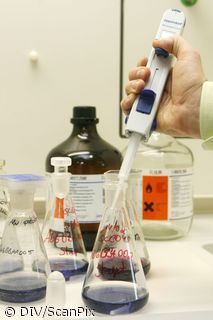CERN's New Particle Accelerator Promises Window on Big Bang
Published:
25 July 2004 y., Sunday
Scientists probing something as big as the origins of the universe sometimes need equipment to match. At the European nuclear research center CERN in Geneva, they're building the most powerful particle accelerator ever. The Large Hadron Collider, as it's called, is expected be able to recreate the conditions that existed at the time of the Big Bang, when the universe was born. Scientists say they hope the new tool will help them unravel the mysteries of matter and energy, and confirm or demolish existing theories.
Contrary to what its name implies, the Big Bang was not necessarily an explosion. Scientists consider the Big Bang to be more of a marker to note that the universe had a beginning. It is the moment in which the universe, space and time were created. CERN Physicist Richard Jacobsson says scientists do not know why or how the Big Bang occurred. But big particle accelerators such as the Large Hadron Collider help them to understand the process.
When the Large Hadron Collider (LHC) is completed in 2007, the superconducting magnets in the machine will operate at 271 degrees, just above absolute zero. However, Mr. Jacobsson says that the temperature created in the proton-proton collisions will be one billion times hotter than at the center of the sun.
Some 6,500 scientists from more than 80 countries currently collaborate on hundreds of ongoing experiments at CERN. The world's biggest particle physics laboratory is celebrating its 50th anniversary this year.
Šaltinis:
voanews.com
Copying, publishing, announcing any information from the News.lt portal without written permission of News.lt editorial office is prohibited.
The most popular articles

The European Commission announced today the award of three of the six contracts for the procurement of Galileo’s initial operational capability.
more »
 As part of the 2009 European Year of Creativity and Innovation, a diverse group of prominent scientists, artists, scholars and business executives - European ambassadors of the year – has come up with an ambitious manifesto.
more »
As part of the 2009 European Year of Creativity and Innovation, a diverse group of prominent scientists, artists, scholars and business executives - European ambassadors of the year – has come up with an ambitious manifesto.
more »
 A hundred teams have arrived to Washington, DC from all corners of the globe, each with an idea to help save the planet.
more »
A hundred teams have arrived to Washington, DC from all corners of the globe, each with an idea to help save the planet.
more »
 NASA is calling its new rocket Ares 1-X the next chapter in space exploration.
more »
NASA is calling its new rocket Ares 1-X the next chapter in space exploration.
more »
 Common rules proposed for cross-border inheritances.
more »
Common rules proposed for cross-border inheritances.
more »
 Solar energy and carbon capture and storage earmarked for lion's share of extra technology funding.
more »
Solar energy and carbon capture and storage earmarked for lion's share of extra technology funding.
more »
 George Smith and his colleague Willard Boyle revolutionized digital imaging technology, and on Tuesday the two men each got an early morning call from Sweden advising they'd been awarded one half of the 2009 Nobel Prize for Physics.
more »
George Smith and his colleague Willard Boyle revolutionized digital imaging technology, and on Tuesday the two men each got an early morning call from Sweden advising they'd been awarded one half of the 2009 Nobel Prize for Physics.
more »
 European Commission called public authorities, business, and researchers to join efforts in order to develop by 2020 the necessary technologies to address climate change, secure EU energy supply and ensure the competitiveness of our economies.
more »
European Commission called public authorities, business, and researchers to join efforts in order to develop by 2020 the necessary technologies to address climate change, secure EU energy supply and ensure the competitiveness of our economies.
more »
 This year's announcement from Stockholm, Sweden -- awarded the Nobel prize for medicine to a trio of Americans for discovering telomerase -- an enzyme which helps prevent the fraying of chromosomes that underlies aging and cancer.
more »
This year's announcement from Stockholm, Sweden -- awarded the Nobel prize for medicine to a trio of Americans for discovering telomerase -- an enzyme which helps prevent the fraying of chromosomes that underlies aging and cancer.
more »
 Since its launch in 1987, the Erasmus programme has helped 2 million students carry out a part of their studies or a work placement in another European country.
more »
Since its launch in 1987, the Erasmus programme has helped 2 million students carry out a part of their studies or a work placement in another European country.
more »
 Three separate missions examining the moon have found clear evidence of water there, apparently concentrated at the poles and possibly formed by the solar wind.
more »
Three separate missions examining the moon have found clear evidence of water there, apparently concentrated at the poles and possibly formed by the solar wind.
more »